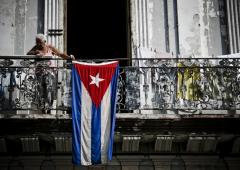Articles by: Sujatha Fernandes
With Venezuela in crisis and the Pink Tide in decline, what’s next for Cuba?
In difficult times, life histories by grassroots Venezuelan activists illuminate valuable lessons from the Bolivarian Revolution
The committment of Fidel Castro and his generation to the building of an alternative model of a socialist society is a memory well worth keeping alive.
Any attempt to engineer a U.S.-affiliated movement from above is destined to be revealed for the farce that it is.
Fifty years ago, in 1961, the Cuban literacy campaign mobilized more than 1 million Cubans as teachers or students. In that same year, 707,000 Cubans learned how to read or write. The new documentary Maestra tells the story of that inspiring campaign through the memories of the women who served as literacy teachers—the maestras themselves.
How can we understand the prospects for U.S.-Cuba relations with the election of a Democratic president to the White House and a change in leadership in Cuba? What domestic constraints and opportunities does Barack Obama encounter as he seeks to open new channels of dialogue with Cuba? The domestic political ground is shifting and relations between Latin American nations are also in flux. Both factors will play a role in shaping U.S. relations with Cuba and with Latin America more broadly.
In both Cuba and Venezuela, the revolutionary imagination has been free to develop in the domain of culture, preserving the legacy of struggle and serving as the social conscience of leftist governments. This legacy of struggle has been preserved and passed down, keeping alive alternative visions for social justice.
Latin America, once thought of as the U.S. "backyard," has been moving further out of the orbit of the United States. As the testing ground for Washington-imposed neoliberal policies, Latin America has now become the locus for a series of left-wing leaders who are contesting these policies, and as they do so, they have been turning towards allies in Europe, China, and the Middle East as a counter to U.S. hegemony. Europe, in particular, has begun sketching out alternative policies that make the U.S. seem increasingly isolated in its approach to Latin America.





